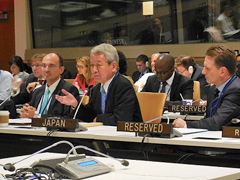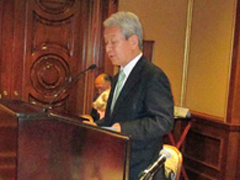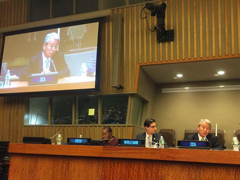JICA President Akihiko Tanaka visited New York from Sept. 25 to 28 to participate in six meetings held in conjunction with the United Nations Summit for the adoption of the 2030 Agenda for Sustainable Development.*1
More than 150 world leaders attended the summit, and on Sept. 25, the Sustainable Development Goals (SDGs) were adopted by the 193 member states as new development goals for the world to achieve by 2030.
Emphasizing the Participation of Women Based on Human Security
On Sept. 25 at United Nations Headquarters, Tanaka attended the “interactive dialogue on inequality and empowering women.” The speakers recognized the critical status of inequality, especially gender inequality and discussed the importance of accelerating a cross-cutting integral approach in social, economic and environmental dimensions and the importance of the cooperation of governments, international organizations, the private sector and civil society. Tanaka said human security, which JICA has adopted as a guiding principle, is also relevant from the perspective of the SDGs, which aim to "leave no one behind." He also emphasized that based on JICA's experience, encouraging the participation of women in development enhances their capacity and leadership.
Discussing Integrated Financing of Humanitarian Assistance and Development Cooperation
On Sept. 26, Tanaka attended the high level roundtable on the financing of humanitarian assistance and development cooperation. At the event, to lay the foundation for the World Humanitarian Summit to be held in May 2016, participants discussed measures to mobilize financial resources to tackle conflict, violence and natural disasters. Many panelists agreed that humanitarian crises are getting larger and longer, and they are deeply related to poverty eradication. The importance of an integrated approach to humanitarian assistance and development cooperation, innovative financing, including the private sector, and effective and flexible finance were also emphasized.

JICA President Akihiko Tanaka emphasizes an integral approach to humanitarian assistance and development cooperation for building a better society.
Tanaka mentioned that it is necessary for both humanitarian and development agencies to participate in discussion at the early stage of crisis, and the concept of "build back better," which is an international concept accepted at the 3rd UN World Conference on Disaster Reduction (held in March in Sendai, Japan), needs to be adopted not only for natural disasters but also for humanitarian crises in order to build a better society.
Expressing Initiatives Toward African Development
On Sept. 26, Tanaka attended the Third Japan-African Regional Economic Communities (RECs) Summit Roundtable, chaired by Japanese Prime Minister Shinzo Abe. In response to the decision to hold the Sixth Tokyo International Conference on African Development (TICAD VI) 2016 in Kenya, views and expectations toward TICAD VI were expressed by the Kenyan President Uhuru Kenyatta, Ethiopian Prime Minister Hailemariam Desalegn, African Development Bank President Akinwumi Adesina, and representatives from the RECs and regional institutions.

JICA President Akihiko Tanaka delivers a keynote address.
As the last speaker in the event, Tanaka raised the following five points as critical for the next year’s TICAD VI: 1. addressing newly emerging challenges in African development since TICAD V, 2. supporting Africa’s ownership and its development initiatives, 3. utilizing “Japan Brands in Africa” such as human resource development, the Coalition for African Rice Development and kaizen, 4. “promoting transformation” and “strengthening resilience” in response to recent changes in Africa and abroad, and 5. promoting Japanese-African business partnerships.
Furthermore, on Sept. 28, a TICAD VI pre-event was held under the sponsorship of JICA, with co-sponsorship from the Japanese government, the New Partnership for Africa's Development Planning and Coordinating Agency (NEPAD Agency), the United Nations Development Programme (UNDP), the United Nations Office of the Special Adviser on Africa, the World Bank and Columbia University.
At the event, entitled "Africa’s Transformation through Industrial Development and Implementing Agenda 2063," there were multiple discussions among the speakers from international and regional institutions, academia and experts from the ground. They included Helen Clark, UNDP administrator; Ibrahim Assane Mayaki, CEO of NEPAD Agency; Erastus Mwencha, deputy chairperson of African Union Commission; Joseph E. Stiglitz, professor of Columbia University (laureate of the Nobel Prize in Economics); Getahun Tadesse, general director of the Ethiopian KAIZEN Institute, and others.
In his opening keynote speech, Tanaka addressed topics key to promoting industrial development and transformation in Africa, experiences in Asia to be applied to Africa, and the achievements of industrial policy dialogue and kaizen project in Ethiopia. From the panel, there were various comments such as that Japan's experience of industrialization, technological development, investment in human resources and education must be shared with Africa through JICA's cooperation programs and business partnerships with Japanese companies.
To close the event, Amina Mohamed, Kenyan Cabinet secretary of Foreign Affairs and International Trade, said that as the host country, Kenya would do its utmost to make TICAD VI successful and said she looks forward to seeing everyone in Nairobi next year.
Contributing to Global Health
Many side events on global health took place at this U.N. summit. Among them were a “Global Health Leaders Meeting”*2 hosted by the Japanese mission to the United Nations on Sept. 26 and a side event entitled “The Path Towards Universal Health Coverage” organized by the Government of Japan and others on Sept. 28. Tanaka participated in both.
At the Global Health Leaders Meeting, Ambassador Atsuyuki Oike, the Ministry of Foreign Affairs' Director-General for Global Issues, opened the dialogue with remarks on Japan’s commitment to global health, leading up to the 42nd G7 summit next May on Kashiko Island, Shima, Mie Prefecture. Tanaka touched on JICA’s operations to develop frontline health workers in countries like Ghana and Sudan, giving assurance that JICA intends to continue working with other development partners to take on major challenges in global health.

JICA President Akihiko Tanaka speaks at a side event on universal health coverage, organized by the Government of Japan and others.
At a side event organized by the Government of Japan along with France, Senegal, Liberia, Thailand, the World Health Organization, the World Bank and the Global Fund, Prime Minister Shinzo Abe delivered the keynote speech. He asserted the importance of Japan’s contribution to global challenges including health, under the banner of “Proactive Contribution to Peace.” He announced the launching of a new global health policy, “Basic Design for Peace and Health” with two pillars: 1. strengthening global health governance in order to better prepare for potential pandemics, and 2. building good systems that can respond to diverse health problems. Also, he indicated Japan’s proactive contribution to global health throughout the G7 Ise Shima Summit, the G7 Kobe Health Ministers’ Meeting and TICAD.
Tanaka spoke at a panel discussion whose participants included a deputy minister of the Liberian Ministry of Health, a director general for global issues of the German Ministry for Development and Economic Cooperation, a vice-president for Human Development of the World Bank, an assistant secretary general of UNDP, a deputy executive director of UNICEF, the CEO of (RED)*3, and a representative of Global Fund Advocates Network. He emphasized JICA’s vision of UHC as not leaving behind mothers and children, including infectious diseases control and pandemic response, and the importance of coordinating among stakeholders to produce synergy between UHC, maternal and child health, and infectious disease control.
(*1) the 2030 Agenda for sustainable Development (2030 Agenda)
The agenda was decided on as international targets for the period from 2016 to 2030 to be the successor to the Millennium Development Goals (MDGs) formulated in 2001. It consists of the Sustainable Development Goals (SDGs) made up of 17 new goals and 169 targets for dealing with issues remaining from the MDGs such as health care and education as well as newly emerging issues such as the environment and increased inequality.
(*2) Global Health Leaders Meeting
Since the 2013 United Nations General Assembly, this meeting has been held two times a year in concurrence with the World Bank IMF spring meeting and the U.N. general assembly. It is an occasion for discussion among high-level representatives of governments, aid agencies and private foundations that play a leading role in global health.
(*3) (RED)
(RED) is a licensed brand, participated jointly by private corporations to support Global Fund. Part of the profit from sales of the products is donated to the fund.




scroll